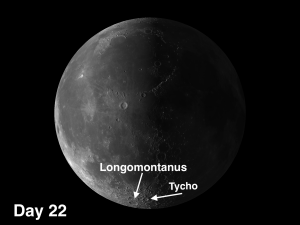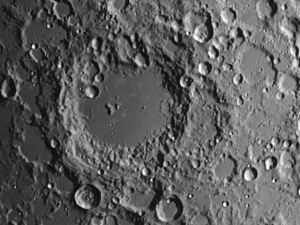 The week of June 24-30 takes us from Day 21 to Day 27. This week we will highlight the crater Longomontanus, viewable on Tuesday and Wednesday in the very early morning.
The week of June 24-30 takes us from Day 21 to Day 27. This week we will highlight the crater Longomontanus, viewable on Tuesday and Wednesday in the very early morning.
Longomontanus: [SW/P7] Take a look at Longomontanus, just southwest of Tycho, and before reading further, decide if something seems slightly “wrong” about the crater.
 Longomontanus is an exception to the rule that crater age can be determined by their relative sizes. Larger craters are almost always older, and when there’s an overlap, smaller craters will intrude upon the rims and floors of their larger and older cousins. The east rim of Longo has superimposed itself on top of what is obviously an older but smaller crater.
Longomontanus is an exception to the rule that crater age can be determined by their relative sizes. Larger craters are almost always older, and when there’s an overlap, smaller craters will intrude upon the rims and floors of their larger and older cousins. The east rim of Longo has superimposed itself on top of what is obviously an older but smaller crater.
======================
It is highly recommended that you get a copy of Sky and Telescope’s Field Map of the Moon, the very finest Moon map available for use at the telescope. It is available for $10.95 at www.skyandtelescope.com and on Amazon. All features mentioned in this blog will be keyed to the grid on the Field Map and will look like this: Plato: [NW/D9]
Credits:
Courtesy of Gray Photography of Corpus Christi, Texas
Lunar photos: NASA / USGS / BMDO / LROC / ASU / DLR / LOLA / Moon Globe. Used by permission
- Rupes Cauchy: A Best Known Fault on the Moon - July 22, 2024
- Moon Crater Schickard – Crater Floor has Stripes - July 15, 2024
- Moon Craters Langrenus and Vandelinus - July 8, 2024